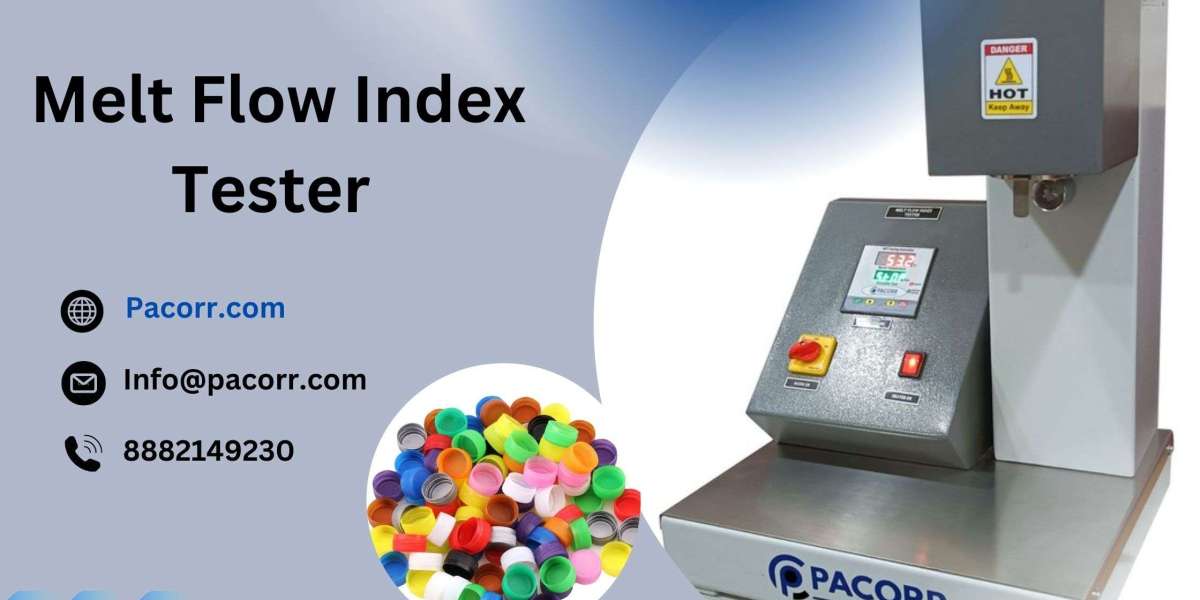What is a Melt Flow Index Tester?
A Melt Flow Index Tester is a specialized instrument used to measure the melt flow rate (MFR) of polymer materials. The melt flow rate is a measure of the ease with which the polymer can flow when melted. It is an essential parameter for evaluating the viscosity and, consequently, the processability of the polymer.
Why is the Melt Flow Index Important?
- Quality Control: Ensuring consistent melt flow rates across production batches helps maintain uniform quality in polymer products.
- Material Selection: The MFI helps engineers and designers choose suitable materials for specific applications based on their flow properties.
- Processing Efficiency: Understanding the MFI allows manufacturers to optimize processing conditions like temperature and pressure during extrusion and molding.
- Performance Prediction: The Melt Flow Index Testing provides insights into the mechanical properties of the final product, aiding in the prediction of performance under various conditions.
How Does a Melt Flow Index Tester Work?
The operation of a Melt Flow Index Tester involves several key steps:
- Heating: The polymer sample is heated to a specified temperature to reach a molten state.
- Loading: A standard weight is applied to the plunger to force the molten polymer through a die of a specified diameter.
- Extrusion: The rate of flow of the polymer through the die is measured over a set period, typically 10 minutes.
- Calculation: The MFI is calculated by weighing the extruded polymer and expressing the flow rate in grams per 10 minutes (g/10 min).
Applications of the Melt Flow Index Tester
- Plastic Manufacturing: Ensures that polymer batches meet specified flow properties, crucial for producing high-quality plastics.
- Compounding: Helps in formulating polymer blends and additives to achieve desired material properties.
- Quality Assurance: Used in the production of various polymer products, such as films, pipes, and containers, to ensure consistent quality.
- Research and Development: Aids in the development of new polymer grades and processing techniques by providing fundamental data on material flow characteristics.
Advantages of Using a Melt Flow Index Tester
- High Precision: Modern Melt Flow Index Tester Price are equipped with advanced sensors and controls for accurate measurements.
- User-Friendly Operation: Designed with intuitive interfaces, these testers are easy to use, requiring minimal training.
- Versatility: Suitable for testing a wide range of polymer types and grades.
- Compliance with Standards: Built to meet international testing standards like ASTM D1238 and ISO 1133, ensuring reliable and accepted results.
Choosing the Right Melt Flow Index Tester
When selecting a Melt Flow Teste, consider the following factors:
- Temperature Range: Ensure the tester can accommodate the temperature requirements of your polymer samples.
- Load Range: The tester should support various load conditions to accurately measure different types of polymers.
- Ease of Maintenance: Opt for a tester that is easy to maintain and calibrate to ensure consistent performance.
- Compliance with Standards: Verify that the tester complies with relevant industry standards to ensure accurate and accepted results.
Conclusion
The Melt Flow Index Tester is a vital tool for anyone involved in polymer manufacturing and quality control. By providing critical data on the flow properties of polymers, it helps manufacturers ensure the production of high-quality products that meet industry standards. Pacorr Testing Instruments offers reliable and advanced Melt Flow Index Tester designed to meet the diverse needs of the polymer industry.
For more detailed information on the Melt Flow Index Tester and other quality testing instruments, visit Pacorr Testing Instruments.
FAQ: Melt Flow Index Tester
What is a Melt Flow Index Tester?
A Melt Flow Index Tester is an instrument used to measure the melt flow rate (MFR) of polymer materials. This measurement indicates how easily a polymer can flow when melted under specific conditions of temperature and pressure.
Why is the Melt Flow Index (MFI) important?
The MFI is crucial for several reasons:
- Quality Control: Ensures consistent production quality.
- Material Selection: Helps choose the right material for specific applications.
- Processing Efficiency: Optimizes manufacturing conditions.
- Performance Prediction: Provides insights into the final product's mechanical properties.
How does a Melt Flow Index Tester work?
The tester heats a polymer sample to a specific temperature, applies a standard weight to the molten sample, and measures the rate at which it Melt Flow Index Testing through a die. This flow rate is then calculated and expressed in grams per 10 minutes (g/10 min).
What types of materials can be tested with a Melt Flow Index Tester?
A wide range of thermoplastic polymers, including polyethylene, polypropylene, polystyrene, and ABS, can be tested with a Melt Flow Index Tester.
What are the typical applications of the Melt Flow Index Tester?
- Plastic Manufacturing: Ensuring polymer batches meet required specifications.
- Compounding: Formulating blends and additives.
- Quality Assurance: Maintaining consistency in various polymer products.
- Research and Development: Developing new polymer grades and processing techniques.
What factors should be considered when choosing a Melt Flow Index Tester?
- Temperature Range: The tester should accommodate the temperature needs of your samples.
- Load Range: Support for different load conditions to measure various polymers accurately.
- Ease of Maintenance: Ensure the tester is easy to maintain and calibrate.
- Compliance with Standards: Verify the tester meets industry standards like ASTM D1238 and ISO 1133.
How accurate are Melt Flow Index Testers?
Modern Melt Flow Index Tester Price are equipped with advanced sensors and control systems, ensuring high precision and accuracy in measurements.
Are Melt Flow Index Testers easy to use?
Yes, contemporary MFI Testers are designed with user-friendly interfaces and often come with automated features, making them easy to operate with minimal training.
What standards do Melt Flow Index Testers comply with?
Most high-quality Melt Flow Index Testers comply with international standards such as ASTM D1238 and ISO 1133, ensuring globally accepted results.
How often should a Melt Flow Index Tester be calibrated?
Calibration frequency depends on the usage and manufacturer's recommendations, but generally, it should be calibrated at least once a year to ensure accuracy.
Where can I find more information about Melt Flow Index Testers?
For more information, detailed specifications, and purchasing options, visit Pacorr Testing Instruments.






